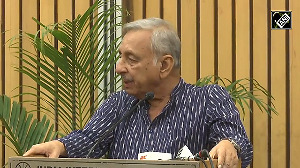An old British jingle says, 'I am the parliamentary draftsman. I compose the country's laws. And of half of the litigation, I am undoubtedly the cause.' Even with the best of intentions, the interpretation of a simple word in a statute or one found in different legislations could pose difficulties for the executive and the courts.
The use of 'and' posed such a difficulty for the Supreme Court in a recent case and it ruled that 'and' is an equivalent of 'or' in a clause in the Electricity Act and 'or' could mean 'and' in some cases. The judges traversed the English decisions and the Mimamsa principles in Sanskrit texts to harmonise provisions in the Electricity Act and the Arbitration & Conciliation Act.
The problem arose in the dispute between Gujarat Urja Vikash Nigam Ltd and Essar Power Ltd in an appeal from the Gujarat high court. The private company allegedly did not utilise its total generating capacity and failed to supply the agreed quantum to the Nigam.
In such an event, the company was required to maintain a particular ratio in the allocation of energy to the Nigam and the Essar group of companies. The power company did not maintain this ratio and supplied more power to the Essar group, ignoring the agreed ratio.
Following this difference of opinion, the power company sought to nominate an arbitrator. The Nigam did not approve of the move and instead approached the state electricity regulatory commission set up under the Electricity Act. To counter it, the company moved the Gujarat high court to nominate an arbitrator under the Arbitration & Conciliation Act.
The high court nominated a retired Chief Justice as arbitrator. However, the Nigam appealed to the Supreme Court, which overruled the high court and decided that the proper forum to solve the dispute was the regulatory commission.
According to Section 174 of the Electricity Act, that law will have overriding effect over any other law in the country. However, Section 175 says that the provisions of the Act shall be "in addition to and not in derogation of other laws".
Therefore, the first question was which law would prevail in this case, the Electricity Act or the Arbitration & Conciliation Act. The Supreme Court ruled, by interpretation, that the Electricity Act would take precedence. This is so because the Electricity Act is a special enactment whereas the Arbitration Act was a general law.
Once the primacy of the Electricity Act was established, the second riddle was whether the regulatory commission had the power to adjudicate the dispute or refer it to an arbitrator. Section 86(1)(f) of the Electricity Act says that the commission shall "adjudicate upon the disputes between the licensees and the generating companies and refer any dispute for arbitration."
However, it is impossible to do both, adjudicate and arbitrate. Therefore, the court ruled that 'and' in this case means 'or'. It cited jurists to justify this sleight of interpretation. Even 'or' has been read as 'and' in some cases. That is the English line of interpretation.
In a lengthy discussion on the Mimamsa principles, the court stated that the Indian system already has a solution to overcome such difficulties. One such is the Smanjasya principle (the principle of harmonious construction). It is illustrated in the maxim of lost horses and burnt chariot. Two men were travelling in their respective chariots. One of them lost his horses and the other's chariot was burnt in a village fire.
The horses which were left were harnessed to the remaining chariot and they continued their journey. This principle is found in the teaching of Panini and Patanjali and is referred to in Tantra Vartika. The Supreme Court wondered why such ancient guidelines were not presented before it, instead of always going to the staple of the Indian lawyers, namely English jurists like Maxwell and Craies. The situation is 'depressing', according to the present judgment. How far these guideposts will change the viewpoint of the judiciary and the legal profession is a complicated question.
However, in practical terms the judgment has put more power in the hands of the regulatory commission. It has the discretion to adjudicate the dispute either by itself or send it to an arbitrator. It has been bestowed with discretion in this matter.
One aggrieved party cannot unilaterally nominate an arbitrator and ask the opposite party to come to the arbitration table. It cannot be done even if the agreement provides for arbitration, because the provisions of the Electricity Act have overriding authority according to the Supreme Court. The high court cannot send the dispute for arbitration either.








 © 2025
© 2025